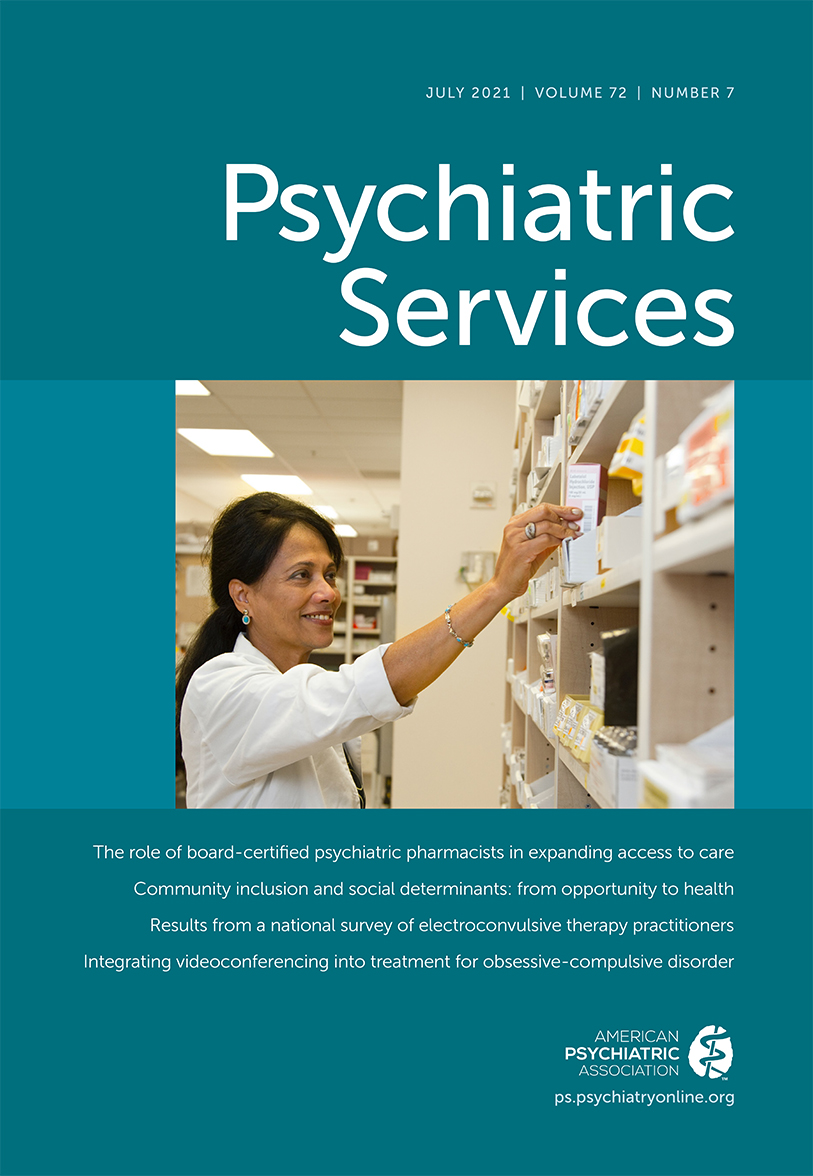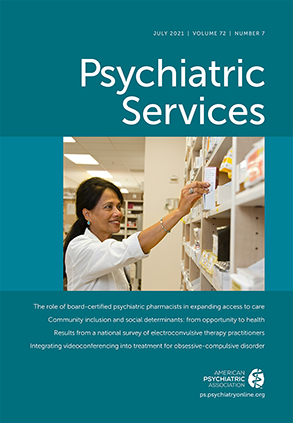People with a serious mental illness, such as recurrent major depressive disorder, bipolar disorder, or a schizophrenia spectrum disorder, have substantially shortened life expectancies (
1). This excess mortality is primarily due to chronic medical conditions associated with highly prevalent risk factors among these patients, including nicotine and/or tobacco use, cardiometabolic conditions, and a sedentary lifestyle (
2). Difficulties accessing and adhering to recommended medical care also increase risk of adverse outcomes and premature mortality among people with serious mental illness and chronic medical conditions, hereafter called serious medical-psychiatric illnesses (SMPIs).
SMPIs are among the most expensive conditions to manage, and much of the health care costs for individuals with these illnesses are attributable to management of medical rather than psychiatric conditions (
3). Although data regarding follow-up care of people with SMPIs after discharge from medical-surgical units are not available, one could assume that their follow-up rates are low, given the combined burden of medical and psychiatric illness. A critical need exists to develop effective care transition interventions for adults with SMPIs to prevent gaps in medical and mental health care during the period immediately after inpatient hospital care.
Intensive care management interventions have been developed for elderly persons who have chronic medical or psychosocial problems requiring moderate or highly complex medical decision making (
4,
5). These time-limited services, which include low-intensity therapy and training to support self- and illness-management skills such as medication adherence, have been shown to improve rates of successful transition from hospital to community care (
4,
5). Despite their demonstrated effectiveness, these interventions are unlikely to meet the more complex psychosocial and medical needs of individuals with SMPIs. These individuals have unique care management needs related to severe functional deficits in domains including self-care, social skills, and independent living; cognitive deficits, including reality distortions, impulsivity, and impaired problem-solving; and the perceived stigma and inadequate training of general health care professionals related to these patients’ needs. People with SMPIs benefit from face-to-face intensive care management. They need care management that is persistent and conducted in person; is delivered by care managers familiar with the local behavioral and primary care health systems (these individuals often engage with health care primarily through connections with psychiatric providers, which need to be leveraged to promote adherence with medical care); is delivered by care managers who can use motivational interviewing, shared decision making, deescalation, and reality testing techniques; includes advocacy on behalf of the individual when indicated; and mobilizes family and other key collateral persons to provide similar support.
Some evidence-based interventions can be adapted to meet the needs of individuals who have SMPIs. Critical time intervention (CTI) is a time-limited approach that mobilizes support during transition periods for people with mental illness at high risk. It is characterized by frequent face-to-face visits by a trained care manager beginning before discharge from the hospital and maintained throughout a period of transition and engagement with community services, provision of practical and emotional support, and the building of sustainable linkages to community-based providers, services, family, and friends. CTI has been successfully applied to populations including adults with mental illness, homeless individuals with mental illness, and individuals transitioning from prison to the community (
6–
8). CTI services improve connections with community-based care among individuals who have high health and social service costs. In one study, brief (3-month) CTI was associated with a significantly lower risk of hospital readmission within 30 days of hospital discharge (28% versus 47%) (
8).
Given its demonstrated effectiveness in other high-risk populations, CTI should be adapted as an approach to improve transitions from inpatient to outpatient care for individuals with SMPIs. Our group is pilot testing a modified brief CTI intervention with funding through the National Institute of Mental Health (NIMH) Optimizing and Personalizing Interventions for People With Schizophrenia Across the Lifespan (OPAL) Center at the New York State Psychiatric Institute. The OPAL Center was created in response to a NIMH funding opportunity announcement for ALACRITY (Advanced Laboratories for Accelerating the Reach and Impact of Treatments for Youth and Adults With Mental Illness) research centers, with the primary goal of accelerating the development and implementation of effective, individualized treatments for patients with schizophrenia in clinical settings.
Pilot Test of a Modified Brief CTI Intervention
We presume that CTI services will have a greater likelihood of success if they are built and evaluated through partnerships with hospital systems and managed care organizations. These partnerships help to ensure that services are not duplicative but instead address relevant gaps in care management and meet the needs of patients. Our project adapted the CTI model for use with patients with schizophrenia admitted to one of two safety-net hospitals in New York City for treatment of a chronic medical condition. Eligible inpatients were randomly assigned to receive either treatment as usual or treatment augmented with CTI services.
In addition to partnering with hospital systems, our CTI project involved partnering with a Medicaid managed care organization (MMCO) operating in New York State. A key element to our modified CTI model involves the MMCO identifying high-need individuals with SMPIs immediately after inpatient admission to a medical-surgical unit. The MMCO links information received daily from hospitals to internal algorithms that identify individuals with SMPIs. The MMCO identifies eligible participants at hospital admission and notifies the hospital treatment team, which can then engage the patient in the study prior to hospital discharge. The recruitment procedures were designed to take advantage of real-world circumstances in which the insurance payer, with its access to comprehensive data on prior service use, can rapidly identify individuals with SMPIs who are most at risk for disruptions in care. These partnerships are important in allowing the MMCO (and the research team) to examine the financial implications of providing CTI services. Although the current project is funded through a federal grant, the expansion of such projects, should they prove effective, will ultimately be the responsibility of the payers.
On the basis of key stakeholder input, we developed a modified CTI model for use by care managers. The manual (see the online supplement to this column) covers three phases of CTI: engagement, transition and linkage, and transfer of care. When eligible hospitalized patients are identified by the partner hospitals, the CTI team is notified, and a care manager meets with the patient as soon as possible on the inpatient unit, prior to discharge. During this engagement period, the care manager begins to build rapport with the patient and assesses the immediate postdischarge needs. The care manager contacts the hospital treatment team to gain an understanding of the discharge plan, inform the treatment team of its role, and coordinate efforts with available hospital care managers supporting the patient. During this initial phase, the CTI care manager is not scheduling appointments but is instead engaging with the patient and the hospital treatment team to facilitate successful implementation of the recommended discharge plan.
The transition and linkage phase begins at the time of hospital discharge. The care manager further refines the needs assessment and begins to connect the patient to relevant community support. Areas of focus during this phase include continuity of medical and psychiatric care, transportation, housing, family support, and social integration. The care manager will help the patient schedule follow-up appointments, if needed, and will accompany the patient to appointments to meet providers and orient them to the CTI services. Ongoing care coordination focuses on facilitating communication between the patient and the patient’s medical and mental health providers, emphasizing a shared–decision-making approach to help ensure the patient adheres to the medication regimen and attends community-based appointments. The care manager provides intensive phone and face-to-face contact with the patient during this phase, 1–2 times per week, and accompanies the patient to ongoing appointments as needed to help ensure the patient receives follow-up care.
In the final phase, transition of care, priority is placed on strengthening the patient’s skills and sense of autonomy in managing service engagement and use while reducing the number of face-to-face contacts with the CTI care manager. As this phase nears its end, the care manager organizes a final treatment planning meeting and warm handoff between the patient and the MMCO or other care manager who will be involved in supporting the patient’s future care.
Our project’s Brief CTI Manual (see online supplement) provides further details regarding the specific activities of each of the three phases of care management and is meant to be a resource for providers interested in implementing such a service. Several questions remain regarding optimal use of CTI care managers. Ideal caseload size is unclear but likely should range from 15 to 20 patients per care manager, far lower than is usually seen in standard disease and care management programs. CTI care managers need to be comfortable working in fast-paced hospital settings and must be persistent in their efforts to engage with patients and coordinate care with multiple providers. Inpatient providers are extremely busy and difficult to connect with, although our initial experiences suggest that they welcome involvement of an experienced care manager to help with the patients they typically view as among the hardest to engage and the most unlikely to adhere to follow-up care. Similarly, care managers must be comfortable appropriately asserting themselves with outpatient providers, who often initially show little interest in communicating with care managers. Accompanying the patient to aftercare appointments is critical because it allows care managers to meet office staff and providers and to develop relationships that support trustful and willing communication.
Conclusions
The integration of medical and behavioral health services for people with SMPIs presents numerous challenges. If we are to be successful in reducing risk of excess mortality among individuals with SMPIs, a multilevel framework approach should be considered. Time-limited, community-based, intensive care management services, such as those provided by CTI, can make headway with the individual and environmental factors and/or the social determinants associated with this risk by focusing on individual behaviors and social supports that contribute to positive outcomes. At the systems level, CTI provides opportunities for improved care coordination, communication, and access to health and behavioral health services. By expanding use of integrated electronic medical records and health information systems, health care systems and MMCOs can play a vital role in identifying, monitoring, and coordinating care for these vulnerable patients.

